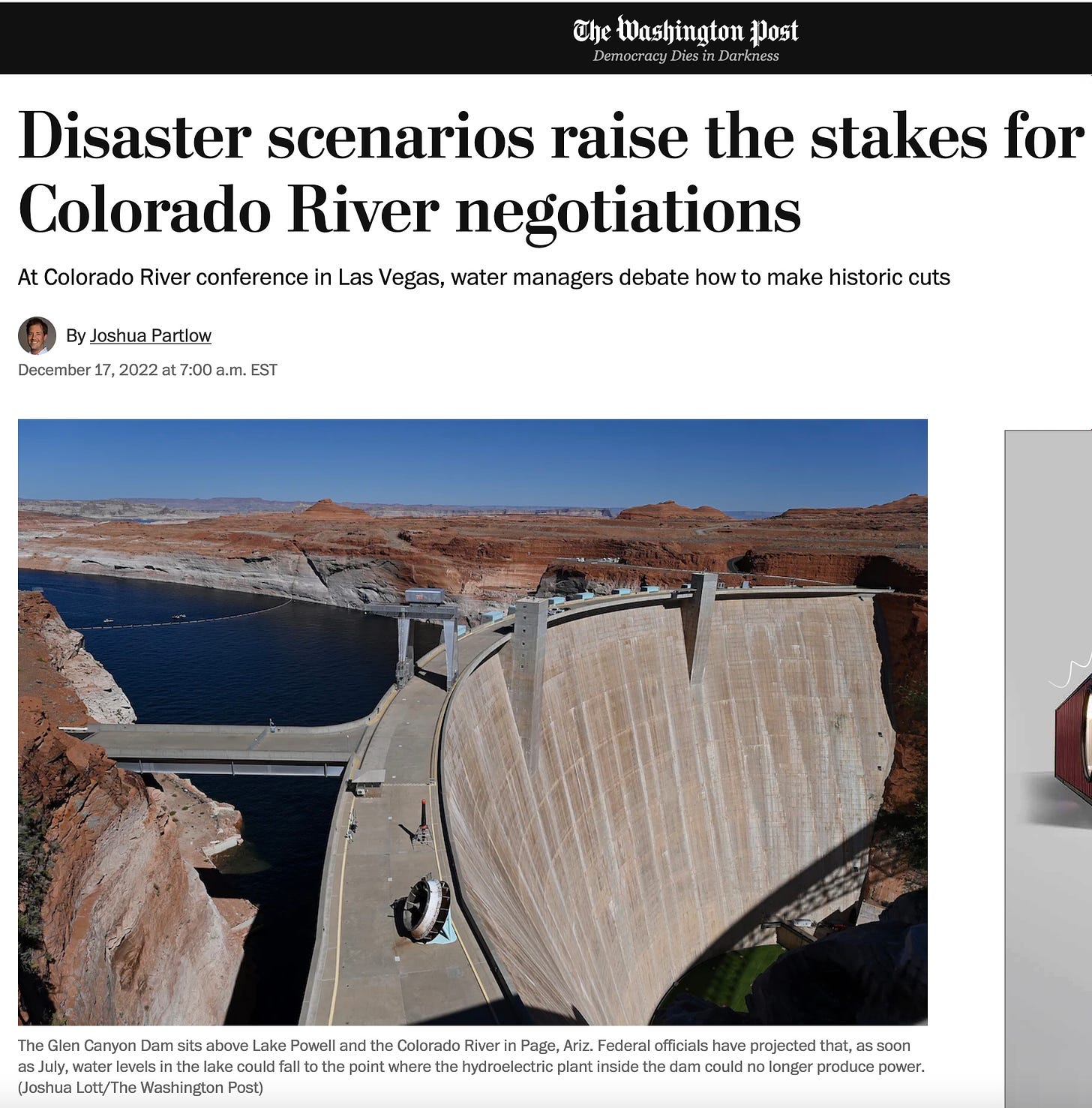Will reduced water in the Colorado River be used to justify reduced irrigation in the US's most productive farmlands?
And reduced food production, higher costs, and less food for export?
https://www.washingtonpost.com/climate-environment/2022/12/17/colorado-river-crisis-conference/
The WaPo says the reduced Colorado River flow is “a stark reality of climate change,” failing to provide specifics.
“…the specter of mass shortages looms as state water managers, tribes and the federal government meet to hash out how to cut usage on an unprecedented scale.”
… The federal government has called on the seven Western states that rely on Colorado River water to cut usage by 2 to 4 million acre-feet — up to a third of the river’s annual average flow — to try to avoid such dire outcomes. But the states have so far failed to reach a voluntary agreement on how to make that happen, and the Interior Department may impose unilateral cuts in coming months…. An acre-foot equals 326,000 gallons, or enough to cover an acre of land in a foot of water.
…The negotiations will ultimately have to weigh cuts in rapidly growing urban areas against those in farming communities that produce much of the country’s supply of winter vegetables.
… Across the West, drought has already led to a record number of wells running dry in California, forced huge swaths of farmland to lie fallow…
The problems on the river have been building for years. Over the past two decades, during the most severe drought for the region in centuries, Colorado River basin states have taken more water out of the river than it has produced, draining the reservoirs that act as a buffer during hard times.
There has been a severe drought, and there has been too much water drawn from the system, due in part to huge population shifts to the southwest US and expansion of agriculture in dry regions.
But strangely, the snow packs in the northern Rockies and Cascades (I did not check elsewhere) are deeper than usual.
Climate science is really complicated, because there are too many inputs. You have to factor in volcanoes, variable precipitation, sunspot activity, ocean currents, wind ….
None of which can be known precisely. And so I am unable to tell you why there is so much less water, so much drought. Is some of this due to weather modification by humans? Don’t know. Will it be the excuse for less food production? That is what I fear.





In California, Gavin had 3 years worth of water dumped into the ocean. And now suddenly farmers can't have water? Why do I think this is an effort to grab the farm land on the cheap? And China is on the hunt for land to feed their people.
Meryl: I have some experience with these matters having lived in the South West for over 20 years and have worked in local politics and with water boards.
Colorado is a head water state, and the primary source of the Colorado River. I am somewhat familiar with these issues, as have dealt with them over time. Still, it is a complex subject, and I do not consider myself an expert.
Water and water rights are covered under Colorado Law as described in non legal terms here:
https://issuu.com/cfwe/docs/weco_cgwlaw_5thed_final
We are also governed by an interstate compact.
Snow pack depth and water content generally determines the amount of next years water flow, and weather we will have water use restrictions.
The amount of water rights owned by a local utility or farmer generally indicates how the available water will be allocated.
Historically, municipalities have purchased farmers water rights from them in order to provide water to their residents. This tends to mean the farms that have sold those rights dry up.
Water in the West is a scarce resource and historically has been allocated by ownership of water rights under a "first in use, first in right" doctrine.
This is not a new problem. Colorado has a system of water courts going back to the 1800's... I have visited the one in Greeley, an approximately 10 story building built in what was a farming community in the very early 1900''s, proudly built without debt (as the plaque on the building reads).
This is a complex subject, and I think you should consider talking with someone who is an expert in it, perhaps an old time water attorney, specializing in this stuff. Anything else is uneducated speculation.